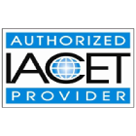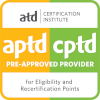HRCI
Certificate in Managing the Hybrid Workforce
Certificate in Managing the Hybrid Workforce
Regular price
$621 USD
Regular price
Sale price
$621 USD
Unit price
per
Couldn't load pickup availability
Navigating the digital-age workforce just got simpler! Learn the art of managing both remote and in-office teams seamlessly. From communication tools to engagement tricks, this certificate is your guide to the hybrid world of work.
Course Duration:9 hours
Credits:
CEU Credits: 0.4
AMA PCM CEU Credits: 0
PDU Credits: 0
HRCI Credits: 0
SHRM Credits: 0
CFRE Credits: 0
ATD CI Credits: 4
ACE Credits: 0
Some benefits of remote work include greater scheduling flexibility, increased employee retention, and larger talent pools to draw from when filling positions or building a team. While organizations benefit in a variety of ways from fully remote work settings, remote work can also present unique challenges, such as breakdowns in communication, diminished company culture, and lower employee engagement. This course examines how organizations can leverage the benefits of remote work while mitigating the challenges. Topics covered include talent planning, performance management, organizational development, and employee engagement—examined in the context of a remote work setting. Through learning about remote work, HR professionals will be better equipped to propose hybrid solutions that align with organizational goals.
Credits:
0.3 CEUs 3
ATD CI Credits 3
HRCIs 0
Some benefits of remote work include greater scheduling flexibility, increased employee retention, and larger talent pools to draw from when filling positions or building a team. While organizations benefit in a variety of ways from fully remote work settings, remote work can also present unique challenges, such as breakdowns in communication, diminished company culture, and lower employee engagement. This course examines how organizations can leverage the benefits of remote work while mitigating the challenges. Topics covered include talent planning, performance management, organizational development, and employee engagement—examined in the context of a remote work setting. Through learning about remote work, HR professionals will be better equipped to propose hybrid solutions that align with organizational goals.
Credits:
0.3 CEUs 3
ATD CI Credits 3
HRCIs 0
Credits:
0.3 CEUs 3
ATD CI Credits 3
HRCIs 0
The Hybrid Workplace
Many have speculated that the era of the traditional office is now over. As organizations adjusted to remote work during the COVID-19 pandemic, employees and business leaders witnessed the unique advantages of remote work, including greater flexibility, increased productivity, and better work-life balance. The Monday-to-Friday in-office schedules of the past have lost their appeal and utility. Through this course, HR professionals will learn how to support employees and organizations shifting to hybrid work arrangements. Through this course, HR professionals will learn how to recruit, train, and support employees working in hybrid settings. Topics covered in the course include how to foster a strong organizational culture in a hybrid setting, and how to manage transitions between remote and in-person work.
Credits:
0.3 CEUs 3
ATD CI Credits 3
HRCIs 0
Credits:
0.3 CEUs 3
ATD CI Credits 3
HRCIs 0
The Modern Office
While there are many benefits associated with remote work, there are certain tasks and activities that can't be easily replicated in a virtual environment. Team collaboration, brainstorming, and culture-building are better suited for in-person settings, where team members can work side-by-side and connect in real time. As organizations transition to hybrid work arrangements, business leaders and HR professionals will need to assess how and when in-person work will be conducted and what the expectations will be for managing job tasks and responsibilities in a hybrid environment. This course examines how the modern office has been reshaped and explores the activities best suited for in-person settings, and addresses topics such as employee health and safety and workspace design.
Credits:
0.3 CEUs 3
ATD CI Credits 3
HRCIs 0
Credits:
0.3 CEUs 3
ATD CI Credits 3
HRCIs 0
Course Description
In response to the COVID-19 pandemic, organizations large and small quickly adapted to remote work settings and alternative workplace solutions to protect employees' health and safety and maintain business continuity. What began as a necessary and seemingly temporary change soon prompted organizations to rethink their work environments and workspace needs entirely. Such significant changes to the traditional office setting have required HR professionals to address key business challenges, including how to support and engage employees in remote settings and how to safely transition back to physical work locations. Many organizations now seek a comfortable middle ground—a work arrangement that maximizes the benefits of remote work while utilizing physical work spaces for tasks and activities that warrant in-person collaboration and connection. HR professionals play a key role in leveraging the benefits of both settings, remote and in-person, to create hybrid solutions that suit the unique needs of their organizations. This certificate prepares HR professionals to manage hybrid workforces, especially during times of transition and as business needs change.
Testimonials
Karin S.
This course offered great material that can be applied to today's workplace environment. Whether a company is fully remote, hybrid or in-office, there are many useful topics that can be applied to just about any work team. I highly recommend taking this course.



